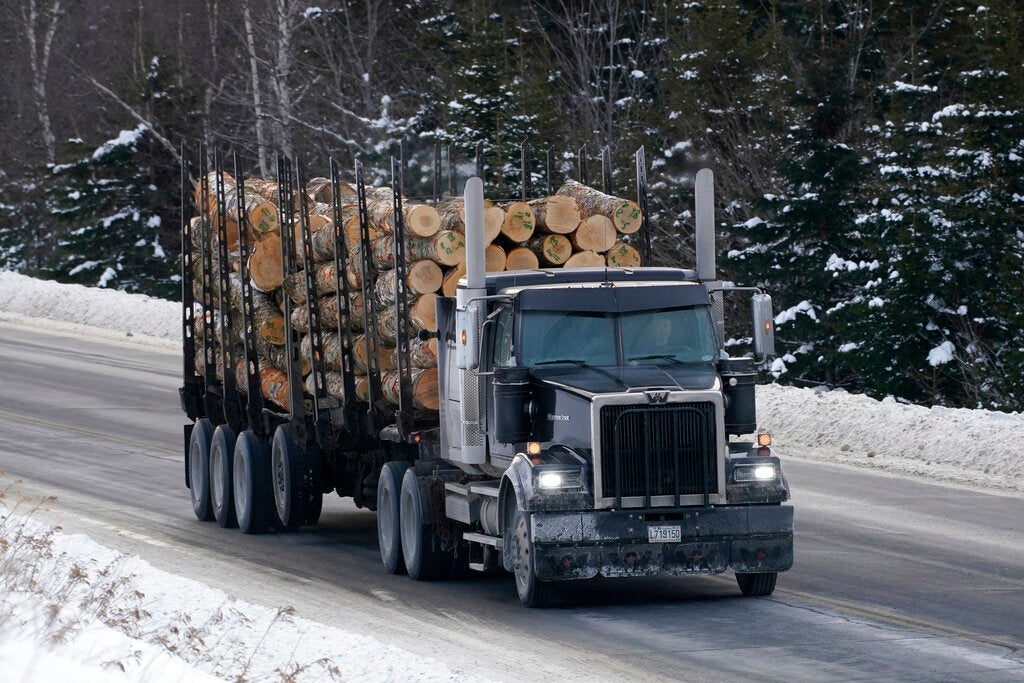The drivers of logging trucks have to navigate school zones, tight intersections and small-town traffic because federal law prohibits them from driving on interstate highways. A new bill from a Wisconsin congressman would change that.
Research suggests the federal weight limit on interstates makes logging truckers’ routes more dangerous, costs timber companies money and leads to more greenhouse gas emissions. They’d use less fuel, make more efficient routes and encounter fewer obstacles on interstates.
U.S. Rep. Mike Gallagher, R-Green Bay, said his bill would change what he calls “outdated” regulations. The measure has the support of Wisconsin’s timber industry and it’s bolstered by new research documenting the inefficiencies and potential dangers of barring the trucks from highways.
News with a little more humanity
WPR’s “Wisconsin Today” newsletter keeps you connected to the state you love without feeling overwhelmed. No paywall. No agenda. No corporate filter.
Every morning at 6 a.m., Scott Koerner, of Oshkosh’s Koerner Forest Products, maps routes with his drivers.
“Very often, we say, ‘Boy, if we could just jump on the interstate, this would be quite an easy run,’” Koerner said. “Sometimes, we’re paralleling that piece of interstate for 60, 70, 80 miles on county roads and state highways, just trying to keep the route still as short as we can.”
In particular, he said the routes that require drivers to pass through school zones are a stressor.
Gallagher said his eyes were opened to the issue when he did a ride-along with a logger in late 2019 and witnessed them navigating the massive vehicles through roundabouts and busy intersections seemingly not designed for them.
“They’re very skilled drivers,” Gallagher said. “But it makes no sense why we seem to make their trip from Point A to Point B almost as challenging as we can.”
Recent research supports the point. Forest resources professors with the University of Minnesota studying timber routes in central and eastern Wisconsin found interstate travel would reduce the time they take by more than 20 percent, would reduce fuel consumption by between 6 percent and 14 percent and would eliminate school zones from the routes.
The biggest difference lies in the vast reduction in the number of intersections and traffic lights the truckers would encounter on interstates. Researchers found they would be down between 64 percent and 88 percent. The findings echoed similar research out of the University of Georgia.
[[{“fid”:”1001816″,”view_mode”:”full_width”,”fields”:{“alt”:”Logging truck”,”title”:”Logging truck”,”class”:”media-element file-full-width”,”data-delta”:”1″,”format”:”full_width”,”alignment”:””,”field_image_caption[und][0][value]”:”%3Cp%3EA%20logging%20truck%20navigates%20a%20local%20road%20in%20Stevens%20Point.%26nbsp%3B%3Cem%3ERob%20Mentzer%2FWPR%3C%2Fem%3E%3C%2Fp%3E%0A”,”field_image_caption[und][0][format]”:”full_html”,”field_file_image_alt_text[und][0][value]”:”Logging truck”,”field_file_image_title_text[und][0][value]”:”Logging truck”},”type”:”media”,”field_deltas”:{“1”:{“alt”:”Logging truck”,”title”:”Logging truck”,”class”:”media-element file-full-width”,”data-delta”:”1″,”format”:”full_width”,”alignment”:””,”field_image_caption[und][0][value]”:”%3Cp%3EA%20logging%20truck%20navigates%20a%20local%20road%20in%20Stevens%20Point.%26nbsp%3B%3Cem%3ERob%20Mentzer%2FWPR%3C%2Fem%3E%3C%2Fp%3E%0A”,”field_image_caption[und][0][format]”:”full_html”,”field_file_image_alt_text[und][0][value]”:”Logging truck”,”field_file_image_title_text[und][0][value]”:”Logging truck”}},”link_text”:false,”attributes”:{“alt”:”Logging truck”,”title”:”Logging truck”,”class”:”media-element file-full-width”,”data-delta”:”1″}}]]
Other analyses have found that allowing logging trucks onto interstate highways may increase crashes. A 2010 pilot program in Maine and Vermont saw more deaths from truck crashes — from one to three in Vermont and four to seven in Maine — but researchers called the results inconclusive due to the small sample size and confounding factors including a simultaneous increase in crashes on state roads.
Federal law now sets trucks’ weight limit at 80,000 pounds for interstate driving. Gallagher’s bill would waive the federal weight limit in favor of limits set by the states. In Wisconsin, under some conditions trucks weighing up to 98,000 pounds are allowed on state and county roads. Wisconsin has also exempted portions of some interstates from the federal limits.
Gallagher previously introduced a similar bill in 2019. It garnered bipartisan support from two dozen cosponsors, but didn’t become law.
Gallagher, a member of the Transportation Committee, said he sees it as a reform that can get support from a bipartisan coalition — something it will need in the Democratically-controlled House.
Wisconsin Public Radio, © Copyright 2025, Board of Regents of the University of Wisconsin System and Wisconsin Educational Communications Board.



